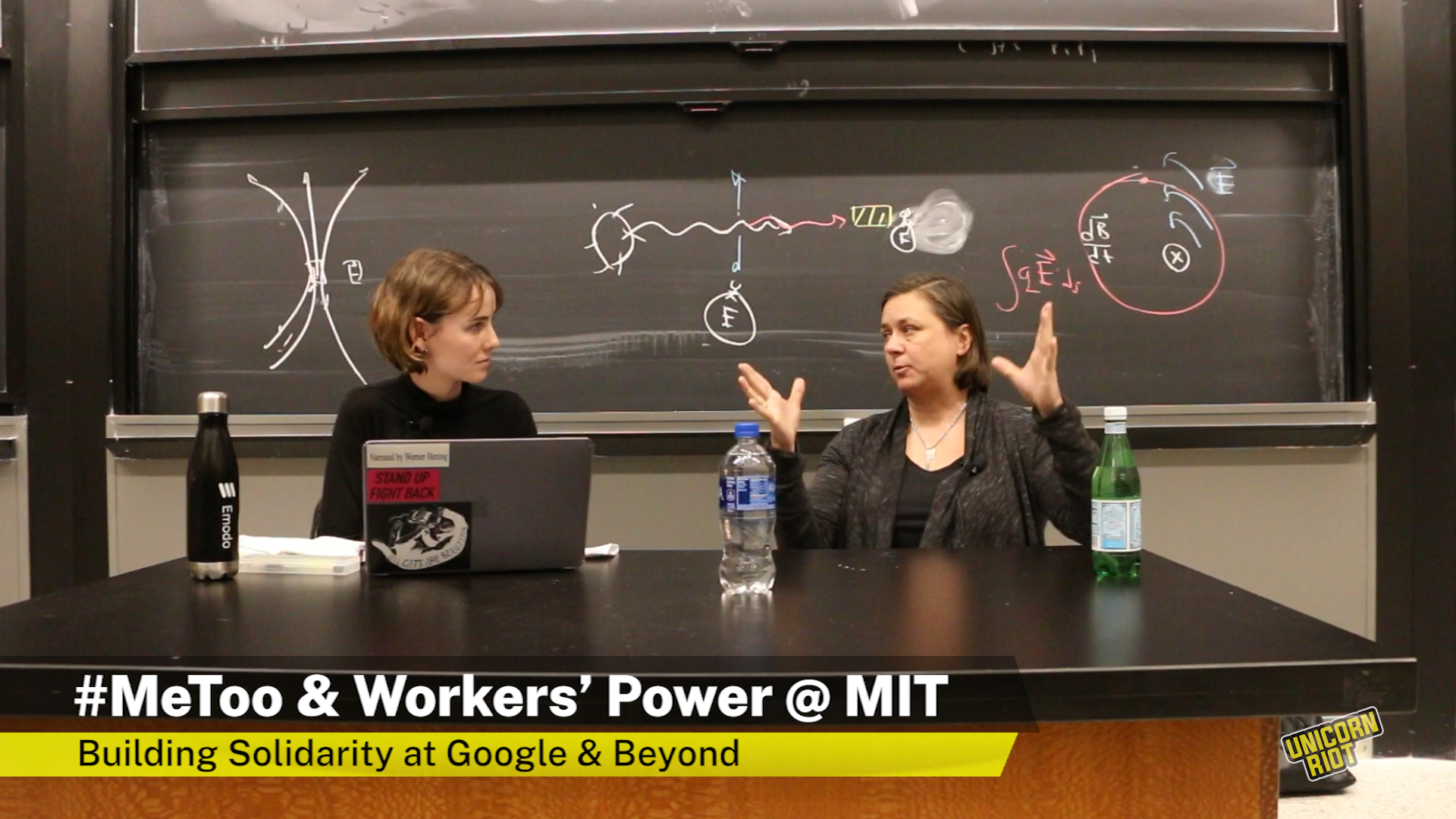Tech Workers Rise Up: Organizing Google’s Worldwide Worker Walkout
Cambridge, MA — At the Massachusetts Institute of Technology on December 11, 2018 an open forum titled, “#MeToo and Workers’ Power: Building Solidarity at Google and Beyond,” covered the inner workings of the global Google walkout of 20,000 employees and contractors in 2018.
Hosted by the Tech Workers Coalition and MIT’s Radius, the speakers and attendees examined the truth about how Google divides its labor force between contractors and workers. The year of 2018 saw unprecedented mobilizations against management at the biggest companies in the tech industry; as the panel showed, worker demands arose through multiple networks and successive controversies that built upon each other, leading to management concessions and further sector-wide organizing.
This video covers the December 11 talk, with complete captioned transcript attached to the video (Download the 16-page transcript here: PDF or DOC), lightly edited to remove pauses and meeting housekeeping.
Before the talk on December 11, far-right US Representative Steve King (R-IA) demanded social media surveillance of Google workers at a U.S. House hearing on Google’s consumer data management practices with CEO Sundar Pichai.
April 2024: Google Employees Sit-In to Protest ‘Project Nimbus’ AI Tech Contract With the Israeli Military
A month earlier on November 1, 2018 Vicki Tardif helped lead a worker walkout at the Cambridge Google office as other workers walked off job sites worldwide. In the panel at MIT, she discussed how she and other workers activated networks of Google employees previously organized around shared concerns including the controversial Maven drone strike targeting AI and Chinese Dragonfly projects.
Several controversies erupted in Google through 2018, but the precipitating event leading to the walkout, according to Tardif, was an October 2018 story in the New York Times about the former chief of the Android project, Andy Rubin, receiving a $90 million golden parachute after accusations of sexual misconduct.
Tardif spoke about the challenges of international organizing including disparate conditions for workforces in other countries – and how overseas Googlers saw projects like Maven for “our” U.S. military quite differently than U.S.-based management. Fighting forced arbitration in employment contracts (which is illegal in some countries Google operates in) had been another hotspot for labor organizing.
During the discussion with attendees, it was noted that recruiters for other companies were letting candidates know that the very same policies that the Google employees had agitated for were now standard policies elsewhere in the industry. This indicated that making clearly defined demands as a group could shape the direction of the tech industry as a whole.
In addition, the Temps, Vendors and Contractors (TVCs) working at Google face precarious employment conditions. Despite performing many key roles and constituting about half its workforce, TVCs could not make demands of management without facing immediate risks to their jobs.
Related: Unicorn Riot covered a “Tech won’t build it” panel at MIT on July 11, 2018, which focused on worker organizing against Immigration & Customs Enforcement (ICE) and Department of Homeland Security contracts as well as other coercive technologies.
Six months to the day after the walkout, on May 1 2019, Google employees held a sit-in at offices around the world to protest retaliatory policies from management. The “Google Walkout for Real Change” project has been collecting stories of management retaliation.
Selected additional reporting on worker organizing at Google:
- The long history behind the Google walkout, by Marie Hicks, November 9, 2018
- After 20,000 workers walked out, Google said it got the message. The workers disagree, by Kara Swisher, November 21, 2018
- Google employees launch campaign to end all forced arbitration, by David Ingram, January 15, 2019
- Vicki Tardif interview on NPR, January 21, 2019
- Google’s Approval Of $135 Million Payout To Execs Accused Of Sexual Misconduct Sparks Fresh Employee Backlash, by Jillian D’Onfro, March 12, 2019
- Forget Project Maven. Here are a couple other DoD projects Google is working on, by Jill Aitoro, March 13, 2019
- Google walkout organizers say they’re facing retaliation, April 22, 2019; The dispute over Google’s alleged retaliation intensifies by Nitasha Tiku, April 26, 2019
- There’s a Battle Brewing at Google Over Employee Speech. The Outcome Affects Us All, by Kade Crockford, April 30, 2019
- Google Workers Protest Alleged Company Retaliation Six Months After Massive Walkout by Melanie Ehrenkranz, May 2, 2019
Follow us on X (aka Twitter), Facebook, YouTube, Vimeo, Instagram, Mastodon, Threads, BlueSky and Patreon.
Please consider a tax-deductible donation to help sustain our horizontally-organized, non-profit media organization:



